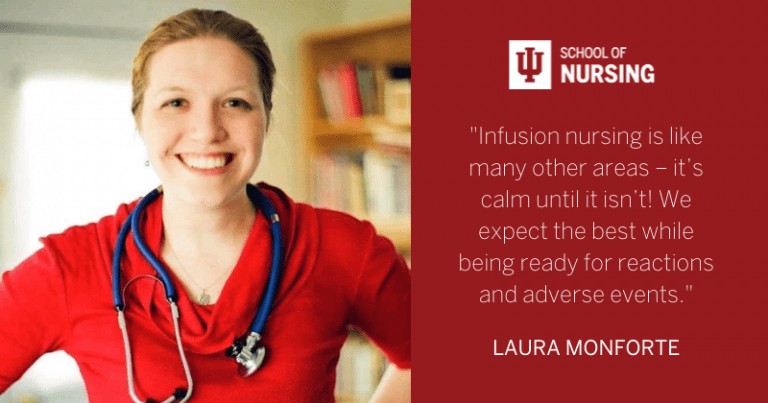Laura Monforte, BSN '14, says infusion nursing is like many other areas of nursing - it's calm until it isn't.
"We expect the best while being ready for reactions and adverse events," says Monforte.
The IU School of Nursing alumna currently works for IU Health's Central Indiana Cancer Centers & Brain Tumor Clinic. Monforte and her fellow infusion nurses specialize in the practice of infusion therapy, the administration of medication or fluids intravenously, and are an integral part of the health care team.
"We are usually the first ambulatory nurses a patient sees after an acute event or diagnosis, so we often step in with care coordination and patient navigation for patients who don't have primary care," says Monforte.
We are usually the first ambulatory nurses a patient sees after an acute event or diagnosis, so we often step in with care coordination and patient navigation for patients who don't have primary care.”
Advancing to this nursing specialty requires time and dedication, but as Monforte says, it also proves rewarding.
"I like that I get to have the time to provide education and support throughout the patient's time in the clinic and throughout their disease journey," says Monforte. "I get to support patients through the hard decisions regarding treatment changes while seeing others improve to the point where they no longer need our services."
Those looking to become an infusion nurse must first complete an accredited nursing program and receive their nursing license. Monforte graduated in 2014 from IUSON's BSN accelerated track, which is designed for students who have earned a degree in a non-nursing field and want to pursue a nursing career.
"The IUSON faculty and curriculum prepare you to ask the right questions and dive into the work as you learn the specialty you chose after graduation," says Monforte. "One of my IUSON instructors is still a valuable resource and career mentor to me. She's encouraged me to take some big steps and helped me through some of the rough times."
The IUSON faculty and curriculum prepare you to ask the right questions and dive into the work as you learn the specialty you chose after graduation."
Monforte's nursing experience has also given her new perspective.
"If you don't know what patient population or specialty you like right out of nursing school, don't be afraid of having a year or two of acute experience."
Monforte says nurses can use that time to be attentive to what they really like in the nursing profession before choosing a career focus - or two.
"And if you ever need to change specialties, it's okay," says Monforte. "You will always use your nursing skills."


